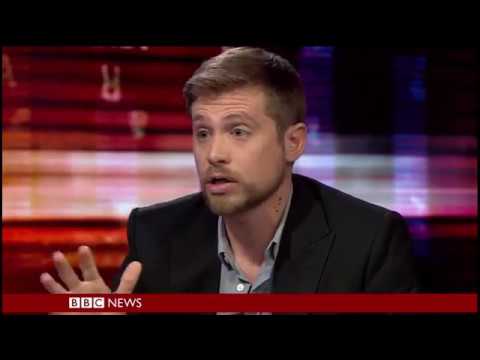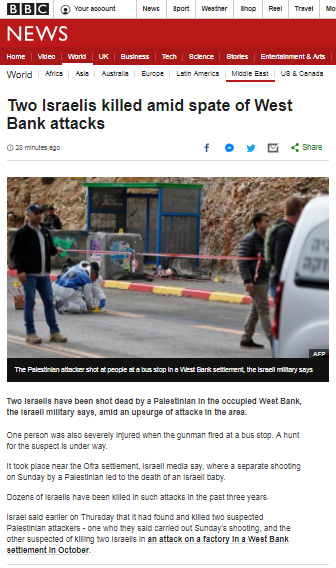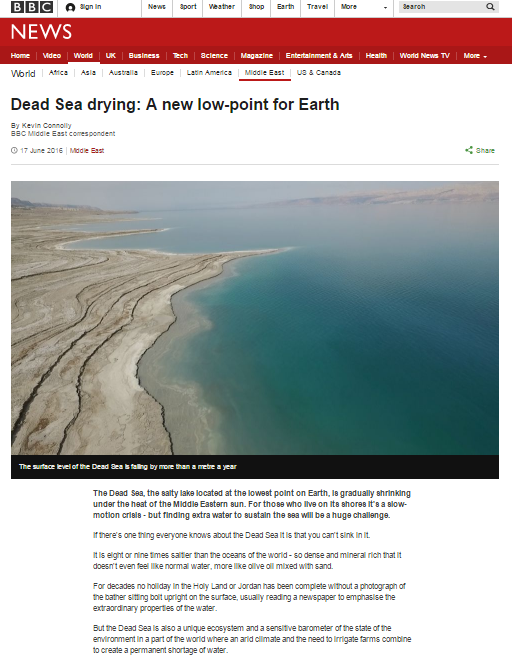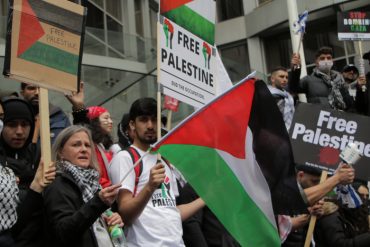In part one of this post we looked at a ‘Hardtalk’ interview with a representative of the political NGO ‘Breaking the Silence’ that was aired on the BBC World News TV channel on February 15th (available in the UK here) as well as on BBC World Service radio on February 16th.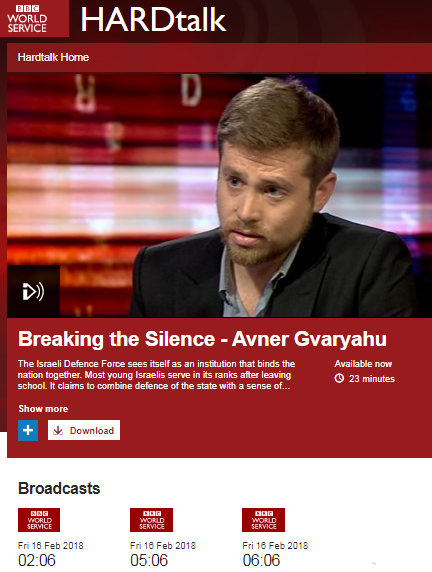
From the start of the programme presenter Stephen Sackur refrained from sticking to asking questions, instead indulging his own political pronunciations. However, BBC audiences next heard the following mini-monologue from Sackur. [emphasis in bold added, emphasis in italics in the original]
Sackur: “Yeah and I want to come back to the politics of this in some detail but just to stick for now with testimony, because ‘Breaking the Silence’ is all about gathering together the voices of soldiers – former soldiers – who are no longer prepared to be silent about what they have seen. I just want you to be very clear with me about some of the other behaviours because you’ve talked about the day-to-day dull routines of the occupation but the other behaviours like for example testimony about looting, stealing, Israeli soldiers stealing from inside Palestinian homes. Other testimony about deliberate acts of violence, striking youths, striking people in their own homes, beating them. Also firing rubber bullets, transgressing the limits that are supposed to be imposed on the firing of those bullets and undoing the packaging so they do more damage. All of these aren’t just about the occupation. They suggest to me an army that has within it significant numbers of soldiers who want to do bad things.”
Gvaryahu: “I mean you could choose to look at it like that. I think it’s more complex.”
Sackur: “But isn’t it important to be honest that there are Israeli soldiers, if this testimony is true – many say it’s not – but if it’s true there are people in the IDF doing very bad things.”
Those four words – “many say it’s not” – were Sackur’s only allusion throughout the whole programme to the fact that many of the frequently anonymous testimonies published by ‘Breaking the Silence’, including Gvaryahu’s own, have been disputed by fellow soldiers and disproven by investigative journalists. Sackur also failed to inform audiences that the IDF Military Attorney General examines all allegations of improper conduct by soldiers and conducts a criminal investigation where necessary – but that ‘Breaking the Silence’ refuses to cooperate with such investigations.
Similarly, Sackur’s sole vague allusion to Palestinian terrorism throughout the whole programme came in the following question:
Sackur: “Can you afford the luxury of this delicate conscience of yours when there is – whatever you say – there is a struggle; a struggle which involves violence on both sides between Israel and the Palestinians?”
When – in response to a question from Sackur about “threats” – Gvaryahu cited “an individual who was caught with about 20 gallons of gasoline trying to burn down our offices”, Sackur did not clarify to BBC audiences that the individual concerned was not in fact “caught trying to burn down” the ‘Breaking the Silence’ office but was indicted for intent to commit arson.
Despite providing a platform for Gvaryahu’s claim of a “smear campaign led from the highest echelons of the Israeli government” against his organisation, significantly, at no point in this interview did Sackur bother to ask Gvaryahu about the highly relevant topic of the considerable amounts of foreign funding accepted by ‘Breaking the Silence’ or the agenda behind that funding.
There is of course nothing remotely novel about the BBC providing a friendly platform for the amplification of politically motivated messaging from ‘Breaking the Silence’ – it has been doing so at least since 2009. It is however interesting to see once again that despite the existence of BBC editorial guidelines stating that “minority views should not necessarily be given equal weight to the prevailing consensus”, the corporation’s generous promotion of this political NGO – that was accurately classified in this interview by Stephen Sackur as “a fringe” and “an extreme” which influences “only a very tiny minority” – continues.
No less remarkable was Stephen Sackur’s own departure from editorial guidelines stating that “our audiences should not be able to tell from BBC output the personal prejudices of our journalists or news and current affairs presenters” in his lengthy promotion of the notion of “soldiers who want to do bad things” and his repeated amateur diagnosis of Israel’s moral health.
Related Articles:
BBC’s ‘Hardtalk’ presenter vilifies Israeli soldiers – part one
The context of the BBC’s promotion of ‘Breaking the Silence’
Investigative report highlights BBC’s NGO impartiality fail

